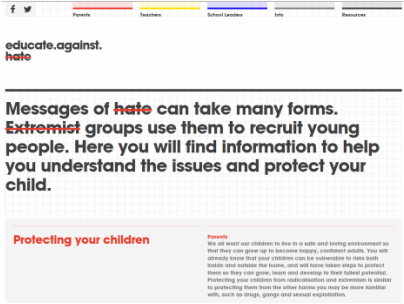Prevent duty

As of 1st July 2015 all schools and registered childcare providers are subject to a duty to, in the exercise of their functions, have “due regard to the need to prevent people from being drawn into terrorism”. This is called the Prevent duty.
At Hathern, our Prevent duty is discharged through our commitment to safeguarding and through our teaching of the broader curriculum, in particular in RE, SMSC and eSafety sessions. In addition to our safeguarding responsibilities, we help pupils build resilience against extremism and radicalisation by fostering a strong Christian ethos and values based education, as well as by providing a safe space for them to debate controversial issues and develop the critical thinking skills and knowledge they need to be able to challenge extremist arguments.
We protect the children in our care against extremism and radicalisation in the same way as we treat protecting them from other harms (e.g. drugs, substance abuse, neglect, abuse, sexual exploitation), whether these come from within their family or are the product of outside influences.
The Prevent duty is not about spying on pupils or carrying out unnecessary intrusion into family life. It is about ensuring that staff know how to identify behaviour of concern and how to refer pupils who may be at risk of radicalisation for appropriate support.
As part of our Safeguarding and Child Protection training, staff at Hathern are given key messages to aid them in identifying pupils at risk.
Further information and advice can be found on the Educate Against Hate website.
At Hathern, our Prevent duty is discharged through our commitment to safeguarding and through our teaching of the broader curriculum, in particular in RE, SMSC and eSafety sessions. In addition to our safeguarding responsibilities, we help pupils build resilience against extremism and radicalisation by fostering a strong Christian ethos and values based education, as well as by providing a safe space for them to debate controversial issues and develop the critical thinking skills and knowledge they need to be able to challenge extremist arguments.
We protect the children in our care against extremism and radicalisation in the same way as we treat protecting them from other harms (e.g. drugs, substance abuse, neglect, abuse, sexual exploitation), whether these come from within their family or are the product of outside influences.
The Prevent duty is not about spying on pupils or carrying out unnecessary intrusion into family life. It is about ensuring that staff know how to identify behaviour of concern and how to refer pupils who may be at risk of radicalisation for appropriate support.
As part of our Safeguarding and Child Protection training, staff at Hathern are given key messages to aid them in identifying pupils at risk.
Further information and advice can be found on the Educate Against Hate website.